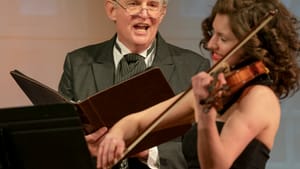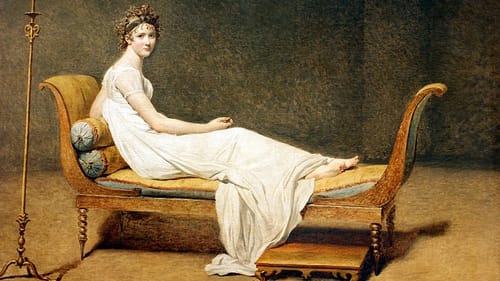Stay in the Loop
BSR publishes on a weekly schedule, with an email newsletter every Wednesday and Thursday morning. There’s no paywall, and subscribing is always free.
Romantic transports
The Fine Art Music Company presents ‘War of the Romantics, Part 1’

We 21st-century creatures have so many ways to experience music that it’s easy to forget how the composers of the sounds we love intended their music to be heard, but the Fine Art Music Company wants to remind us, and its War of the Romantics program at the Ethical Society was a great example.
Founded by pianist Rollin Wilber in 2010, this small but feisty group of Philadelphia musicians and music lovers has developed an approach to presenting “fine art” (i.e., classical) music in small, intimate settings. In the case of its most recent performance, that meant a packed house with a palpable sense of enthusiasm for an all-Romantic program.
Not for dilettantes
War of the Romantics Part I was presented twice, first at Ivy Hall on Lancaster Avenue, and then the concert I attended, in the cozy conference room at the Philadelphia Ethical Society, co-sponsor of the event. The Ethical Society is one of those distinctly Philadelphia venues recalling a bygone era in which earnest citizens merged a desire to foster social good with lofty ideals about high culture. I felt as though I were plunged into another time as I read the motto across the proscenium arch: “The Place Where We Meet To Seek The Highest Is Holy Ground.”
But that sense of separation from time and place quickly dissolved in a program that was at once ambitious and delightful. The acoustics of these small venues may not match the calibrations of the great concert halls of Europe, but they make up for it in accessibility, warmth, and resonance. Although brilliantly performed by the soloists throughout, this was not a program for musical dilettantes. Rather, the focus lay in enveloping listeners of diverse backgrounds with waves of luxurious sound, bringing a smile of recognition, and perhaps a tear of deeply felt emotion. In short, it was everything a Romantic could ask for.
Romantic gems

With an engaging and often-amusing script by Ella Remmings, the narrator, played by Robert Edwin, took the form of a 19th-century music critic, the fictitious Gerhard Denhoff. This theatrical approach recalled this season’s Philadelphia Orchestra tributes to Leopold Stokowski and Albert C. Barnes, featuring actors speaking between selections (though this production apparently was not inspired by those concerts). At times, pre-selected members of the audience were invited to pull up a chair on the stage to better recreate the atmosphere of a salon, although it was not quite the same as seeing Jacques-Louis David’s Madame Récamier reclining on a chaise lounge.
Throughout the course of the evening, three musicians presented gems from the Romantic repertoire. Violinist Adelya Shagidullina performed the first movement of Beethoven’s Sonata for Violin and Piano, the “Spring” sonata, with elegance, grace, and a pure, singing tone, as Wilber accompanied in full musical partnership. The work was followed by Wilber playing the first movement of Robert Schumann’s rhapsodic Fantasy for Piano, so full of passion, with a storm of growling 16th notes in the bass, and the yearning half and whole tone chords rising above. It was the kind of performance that makes you imagine the pianist himself has composed it, from his own well of experience and feeling. (But of course, it was pure Schumann, giving us the distilled essence of his love for Clara.)
Salon Sequence
I especially enjoyed a “Salon Sequence,” featuring Clara Schumann’s Romance for Violin and Piano and Robert Schumann’s moving song, “Widmung” (Dedication) for voice (Edwin) and piano (Wilber). As though that were not enough, Wilber performed a version of the song as arranged by Liszt, and then was joined by Shagidullina in the Leopold Auer arrangement. All the short works had a casual, welcoming appeal. Even with three versions tumbling one after the other, it was not possible to get too much of this good thing.
Wilbur played Brahms’s modal ballade, Edward, before joining pianist Katarzyna Salwinski in a four-hand transcription of the third movement of Brahms’s Symphony No. 3. If you love old movies, you’ll recognize this in the soundtrack of Goodbye Again (1960) with Ingmar Bergman and Anthony Perkins. What a thundering performance, and appropriately so.

A salon of the mind
After intermission, Salwinski dazzled with performances of Chopin’s Scherzo in B minor, a hotpot of cunning little phrases and torrential outpourings of sound, and Liszt’s otherworldly “Vallée d’Obermann” from the First Year of Pilgrimage, a bright performance of sparkling clarity, showcasing Salwinski’s impressive technique and emotional empathy with the composer’s vision. Shagidullina returned, this time in her role as violist, not violinist, in two of Robert Schumann’s Fantasiestücke. How glorious to hear the deep voice of the viola played by a young master in such close proximity.
The program, more than two hours, was a good length for a 19th-century audience, but perhaps a bit too long for today’s listeners. The musical rewards did not diminish with time, however, ending with a powerful performance of the second movement of Brahms’s Piano Concerto No. 2 in B flat transcribed for four hands by the composer. Again, Wilbur and Salwinsky transported us musically into a 19th-century salon — and into the salon of the mind, where great music from every era can be savored and enjoyed with fresh appreciation, time and again.
War of the Romantics Part II is coming up on March 30 and 31.
What, When, Where
War of the Romantics, Part I: Musical Raptures. Works by Beethoven, Robert Schumann, Clara Schumann, Johannes Brahms, Frédéric Chopin, and Franz Liszt. With a script by Ella Remmings. Katarzyna Sawlinski and Rollin Wilber, piano; Adelya Shagidullina, violin and viola. The Fine Art Music Company. January 26, 2019, at the Philadelphia Ethical Society, 1906 S. Rittenhouse Square, Philadelphia. (215) 803-9725 or www.fineartmusic.com.
Sign up for our newsletter
All of the week's new articles, all in one place. Sign up for the free weekly BSR newsletters, and don't miss a conversation.

 Linda Holt
Linda Holt